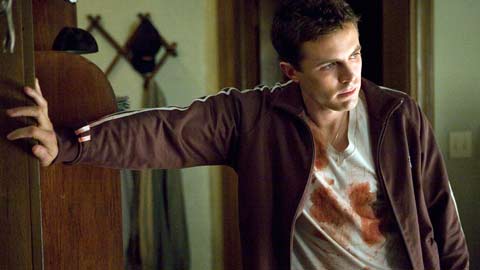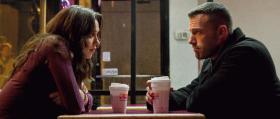
Unexpectedly, Gone Baby Gone
boasts one of the year's scariest scenes. It comes partway into the film's
third act and involves a guy with a shotgun and unclear intentions. It works as well as it does for the usual reasons: story,
performance, camerawork. It's so thoroughly
gripping that I didn't realize until it was over that all my critical faculties
had been put temporarily and decisively on hold. It's one of those rare moments
when I'm not engaging with the narrative intellectually, as a piece of art, but emotionally, as experience. That seems to happen less and less
often these days, but when it does, it's bliss.
Bliss, huh? So
how did Ben Affleck learn enough
about directing to get a curmudgeon like me--who
had no fucking use for him even in his widely lauded cred-grabbing performance
in last year's Hollywoodland--to
break out the purple prose? Well,
it's true that Gone
Baby Gone follows the timeless
Hollywood rule that you hire veteran cinematographers to keep the tyros from
spinning their wheels behind the camera--this film is shot by John Toll,
surely as watertight an insurance policy against abject failure as
exists in the L.A. region. And it's also true that GBG benefits greatly from a
direct, unaffected lead performance that happens to be delivered by the
director's kid brother. (I'm not saying Casey's performance is a Ben-enhanced fluke--I mean, I saw The Assassination of Jesse James by the Coward Robert Ford--just that it's a lucky break for a first-time director.) And of course there's the source material, which supplies a plotline that stretches credulity but is, nonetheless, efficiently provocative.
Having once started and abandoned a Dennis Lehane novel because I just felt too grimy to continue, I was happy to find this material isn't as bleak as I feared. There is an unexpected measure of optimism to the story, although what's gripping about the film's
denouement is the way it makes you reconsider the idea of optimism and moral
rightness. Certainly all of this business must
have been laid out in the novel, but Affleck--a co-writer of the screenplay--smartly brings it to the screen without underscoring the points strongly
enough to ruin it. Do I see rookie mistakes? Of course I do--there
are many different choices Affleck could have made on the micro level that
would make this a little bit stronger in my eyes. The only thing close to a
deal-breaker I see is the casting of Michelle Monaghan, a terrific actor who
just doesn't fit in with this company. (Imagine GoodFellas with Julia Roberts in the Lorraine Bracco role. Not
working, is it?) Further, this could have been tightened up
considerably, taking out some of the explanatory dialogue, and the film
would only benefit from the brevity and sharpened focus. Otherwise, it's classic: a stirring tale, very well told.
But what does
Affleck bring to the picture? What seems like a genuine kinship with the
working class. The ability to depict a casually white-trash mother (Amy Ryan), probably
unfit for parenthood, without unnecessary scorn or condescension. (I'm not as
keen on the horror-show denizens of a local stash house--the film briefly
crosses The Texas Chain Saw Massacre
and the harrowing crack house scene in Jungle
Fever--but you take what you can get.) The respect for location, featuring
Boston street corners that feel real even if the bars that stand there are
confabulations. And, most of all, an affinity with performers that's a likely
byproduct of his career as an actor. Granted, I haven't watched anywhere near all of Ed Harris's
movies (notably I missed his Oscar-nominated performances in Pollock and The Hours), but this is as good as
I've seen him--it's better even than his showcase role in A History of Violence because, to some
extent, he's playing against type. (You only really appreciate his technique
after you figure out where the story is going.) Morgan Freeman plays a stock
Morgan Freeman type with a twist, and Casey Affleck just looks like a lost boy
trying hard to do the right thing; you can see the spark of moral certitude
creep into his eyes as his performance develops. By the end of the movie, the
irony is that his status as crusader is so fully developed that, maybe, it becomes harder
to tell right from wrong. (The final shot is a keeper.)
A taut
thriller about the attractions of moral relativism--turns out that what could
have been a Hollywood vanity project turns out to be one of the best movies of
the year. Pretty sweet deal. Does he have another one this valuable in him? No
idea. Just in case, let's keep Affleck behind
the camera from here on out. A-

